Glossary - Principles of Health Sciences 1 – 1 - ثاني ثانوي
CHAPTER 1: HISTORY AND TRENDS OF HEALTH CARE
CHAPTER 2: HEALTH CARE SYSTEMS
CHAPTER 3: CAREERS IN HEALTH CARE
CHAPTER 4: PERSONAL AND PROFESSIONAL QUALITIES OF A HEALTH CARE TEAM MEMBER
CHAPTER 5: LEGAL AND ETHICAL RESPONSIBILITIES
CHAPTER 6: MEDICAL TERMINOLOGY
CHAPTER 7: HUMAN GROWTH AND DEVELOPMENT
CHAPTER 8: NUTRITION AND DIETS
CHAPTER 9: COMPUTERS AND TECHNOLOGY IN HEALTH CARE
GLOSSARY A abbreviations-Shortened forms of words, usu- ally just letters. absorption-Act or process of sucking up or in; taking in of nutrients. abuse-Causing physical harm or pain, or men- tal anguish to another. accreditation-Ensures that the program of study meets the established quality compe- tency standards and prepares students for em- ployment in the health care career. biotechnology-The use of the genetic and bio- chemical processes of living systems and or- ganisms to develop or modify useful products. body mass index (BMI)-A calculation that measures weight in relation to height and cor- relates this with body fat; used to determine whether an individual is underweight, has ideal weight, or is overweight. C calorie-Unit of measurement of the fuel value of food. affection-A warm or tender feeling toward an- carbohydrates-Group of chemical substances other; fondness. alternative therapies-Methods of treatment used in place of conventional biomedical therapies. antioxidants-Enzymes or organic molecules that help to protect the body from harmful chemicals called free radicals. assault and battery-Assault is a threat to injure a person, and battery is the unlawful touching of a person without consent. associate's degree-Degree awarded by a voca- tional technical school or community college after successful completion of a course of study. B bachelor's degree-Degree awarded by a college or university after a person has completed a course of study. balanced diet-A diet that includes all the essen- tial nutrients in the correct amounts. Bill of Rights and Responsibilities-A docu- ment issued by the Saudi Arabia Ministry of Health aiming to improve patients' and health- care professionals' experience and focusing on the quality of care provided. bioethics-aims to investigate and study how health care decisions are made. including sugars, cellulose, and starches; nutri- ents that provide the greatest amount of energy in the average diet. cellulose-Fibrous form of carbohydrate. certification-The issuing of a statement or cer- tificate by a professional organization to a per- son who has met the requirements of education and/or experience and who meets the stan- dards set by the organization. cholesterol-Fatlike substance synthesized in the liver and found in body cells and animal fats. clinics health care facilities that are primarily focused on the care of patients out of hospital. communication-Process of transmission; ex- change of thoughts or information. complementary therapies-Methods of treat- ment used in conjunction with conventional biomedical therapies. computer-assisted instruction-Teaching method in which computer programs are used to control the learning process and deliver the instructional material to the learner. computed tomography (CT)-A scanning and detection system that uses a minicomputer and display screen to visualize an internal portion of the human body. وزارة التعليم Minister Eductition 2022-1444 GE44.PATHWAYS.G02.S2.HLTH SBindb 165 GLOSSARY 165 14/10/2022 10:15
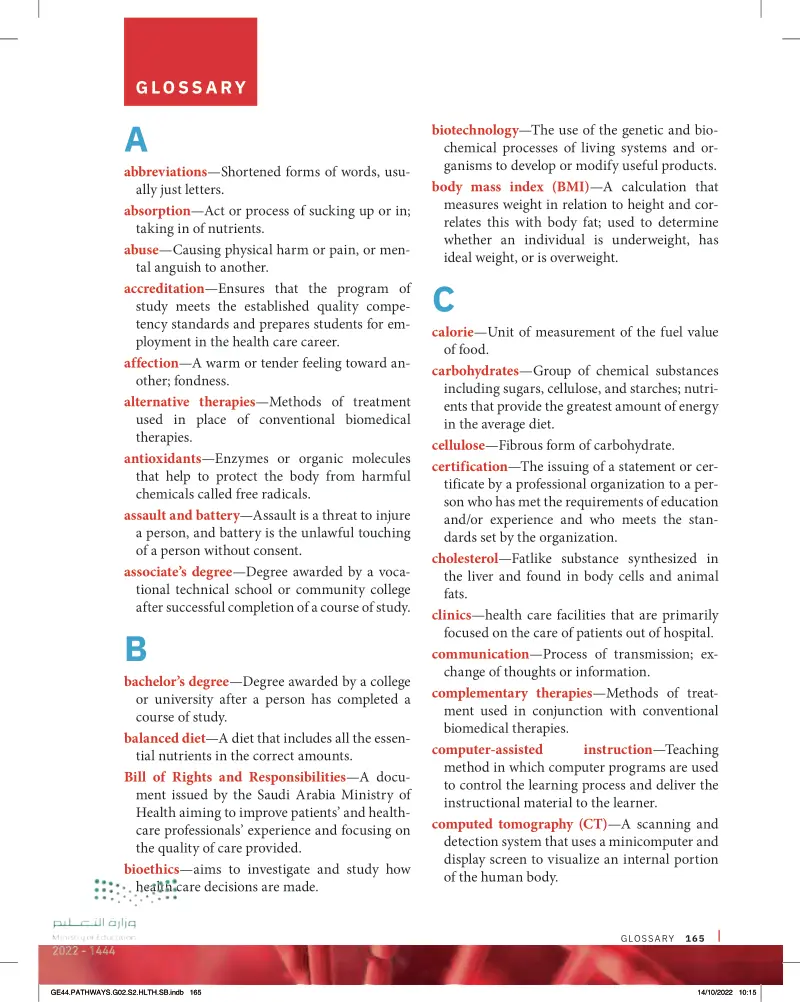
GLOSSARY: abbreviations
confidentiality-Keeping information private. continuing medical education (CME)-Train- ing required to renew licenses or maintain cer- tification or registration. contract-To shorten, decrease in size, or draw together; an agreement between two or more persons. cost containment-Procedures used to control costs or expenses. cultural diversity-The different values, beliefs, attitudes, and customs shared by groups of people. D defamation-A false statement that causes ridi- cule or damage to a reputation. defense mechanisms-Unconscious acts used to help a person deal with an unpleasant situation or socially unacceptable behavior. dental offices-Places where dental services are provided, which can include general care pro- vided to all age groups, or specialized care of- fered to certain age groups, or for certain dental conditions like orthodontics (straighten teeth). diagnosis-Determining what is wrong with a person. digestion-Physical and chemical breakdown of food by the body in preparation for absorption. doctorate/doctoral degree-Degree awarded by a college or university after completion of a prescribed course of study beyond a bachelor's or master's degree. E echocardiogram-A cardiac test that uses tech- nology to direct ultra-high-frequency sound waves through the chest wall and into the heart; a computer then converts the reflection of the waves into an image of the heart; usually a reading is taken while the patient is at rest وزارة التعليم Minst 166 GLOSSARY 2022-1444 and then another reading is taken after exer- cise when the heart rate rises to a target level; used to evaluate cardiac function, reveal valve irregularities, show defects in the heart walls, and visualize the presence of fluid between the layers of the pericardium or bleeding. electrocardiogram (ECG)-Computerized in- terpretation system of the electrical activity of the heart. electronic health records (EHRS)-All of a pa- tient's medical information stored on a com- puter, usually in a hospital. emergency care services-Special care provided urgently for victims of accidents or sudden (acute) illness. empathy-Being able to identify with and un- derstand another's feelings, situations, and motives. energy conservation-Monitoring the use of en- ergy to control costs and conserve resources. entrepreneur-An individual who organizes, manages, and assumes the risk of a business. eponyms-Terms used for things that are named after the people who discovered them, or places or things associated with them. essential nutrients-Those elements in food re- quired by the body for proper function. esteem-Place a high value on; respect. ethics-Principles of right or good conduct. exercise stress test-A cardiac test involving an ECG run while the patient is exercising; usu- ally involves walking a treadmill or riding an exercise bike until a target heart rate is reached; allows the physician to evaluate the function of the patient's heart during activity. expressed consents-Consents stated in distinct and clear language, either orally or in writing. GE44.PATHWAYS.G02 S2.HLTH.SB.indb 166 14/10/2022 10:15
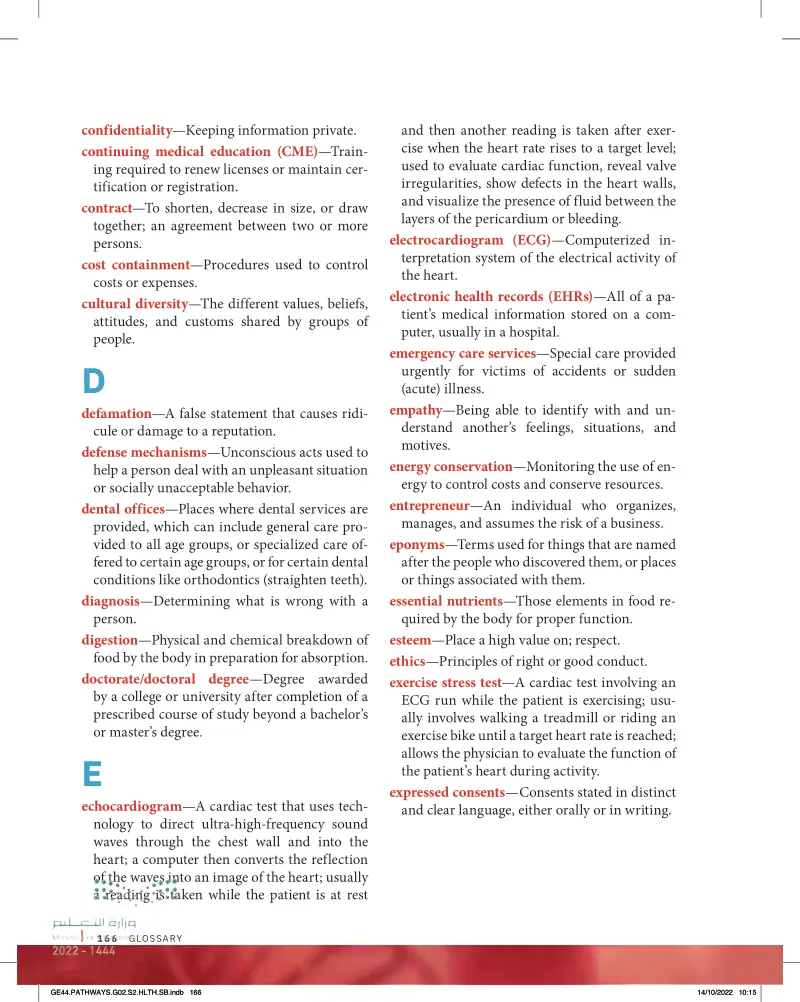
GLOSSARY: confidentiality
F fats-Also called lipids; nutrients that provide the most concentrated form of energy; highest- calorie energy nutrients. feedback-A method used to determine whether communication was successful, which occurs when the receiver of a message responds to the message. G geriatric care-Care provided to older individuals. goal-Desired result or purpose toward which one is working. government health agencies-bodies that have roles in legislation, making sure that the rules are followed, and supervision. H health clusters-integrated networks of health care facilities under one administrative struc- I image-guided surgery-A surgical procedure in which a surgeon uses preoperative and intra- operative images on a computer screen to guide or direct the surgery. implied consents-Obligations that are under- stood without verbally expressed terms. informed consent-Permission granted volun- tarily by a person who is of sound mind and aware of all factors involved. Interpersonal relationships-Relationships be- tween people and groups. L laboratories-Rooms or buildings where scien- tific tests, research, or experiments take place. Devices for patients, such as false teeth, are also prepared in laboratories. lasers-Light beams that can be focused precisely. leader-An individual who leads or guides oth- ers, or who is in charge or in command of others. ture, each serving around one million people, leadership-Ability to lead, guide, and direct with mobility of medical professionals within the system. health insurance plans-Plans that enable many people to pay for the costs of health care; when the insured individual incurs health care ex- penses covered by the insurance plan, the in- surance company pays for the services. hearing assistive technology-Devices that help a person to hear more clearly. holistic health care-Care that promotes physi- others. licensure Process by which a government agency authorizes individuals to work in a given occupation. life stages-periods of growth and development in a person's life. lipids-Organic compounds commonly called fats and oils; provide the most concentrated form of energy for the body. cal, emotional, social, intellectual, and spiritual listening-Paying attention to what someone is wellbeing. home health care-Any type of health care pro- vided in a patient's home environment. hospitals health care facilities that provide treatment on site with specialized staff and equipment. saying, making an effort to hear someone. long-term care facilities-Mainly provide as- sistance and care for elderly patients, usually called residents but also provide care for indi- viduals with disabilities or handicaps and in- dividuals with chronic or long-term illnesses. وزارة التعليم Ministry of Eduction 2022-1444 GE44.PATHWAYS.G02.S2.HLTH.SB.indb 167 GLOSSARY 167 14/10/2022 10:15
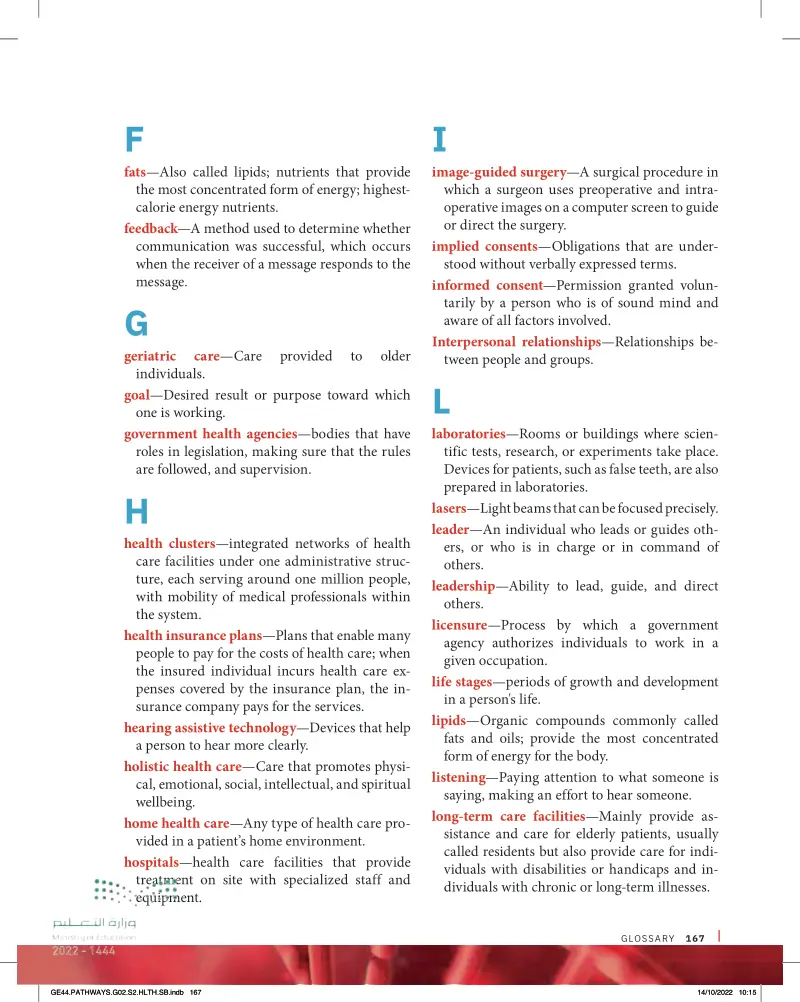
GLOSSARY: fats - feedback
M magnetic resonance imaging (MRI)-Process that uses a computer and magnetic forces to vi- sualize internal organs. master's degree-Degree awarded by a college or university after completion of one or more years of prescribed study beyond a bachelor's degree. Medical city-A very large medical center with multiple facilities and multidisciplinary health care teams. metabolism-The use of food nutrients by the body to produce energy. minerals-Inorganic substances essential to life. N nanotechnology-A technology that uses tech- niques to manipulate atoms and molecules to create new materials and devices. needs a lack of something that is required or desired. nonverbal communication-The use of facial expressions, body language, gestures, eye con- tact, and touch to convey messages or ideas; communication that is not spoken. nutrition-All body processes related to food; the body's use of food for growth, development, and health. obesity-excessive body weight 20 percent or more above the average recommended weight, or a BMI equal to or greater than 30. optical centers-Provide vision examinations, prescribe eyeglasses or contact lenses, and check for the presence of eye diseases. organizational structure-A line of authority or chain of command that indicates areas of responsibility and leads to the efficient opera- tion of a facility. outpatient services-Services provided to pa- tients who have not been admitted to hospitals or other care facilities. P pandemic-An infectious disease that affects many people over a wide geographic area; a worldwide epidemic. patients' rights-Factors of care that all patients can expect to receive. physiological needs-Basic physical or biologi- cal needs required by every human being to sustain life. Preferred Provider Network (PPN)-A group of health service providers approved by the Saudi Arabia Council of Health Insurance to provide health services to an insured person. prefix-An affix attached to the beginning of a word. privileged communications-all information given to health care personnel by a patient. proteins-Basic components of all body cells; one of the essential nutrients needed for growth and repair of tissues. puberty-Period of growth and development during which secondary sexual characteristics begin to develop. R radiation therapy-The use of high-energy par- ticles to decrease the size of tumors and treat cancer. registration-A professional body administers examination and maintains a list of qualified people. robotic surgery-Performing surgery with a me- chanical device that is computer controlled. وزارة التعليم Minis 168 GLOSSARY 2022-1444 GE44.PATHWAYS.G02 S2.HLTH.SB.indb 168 14/10/2022 10:15
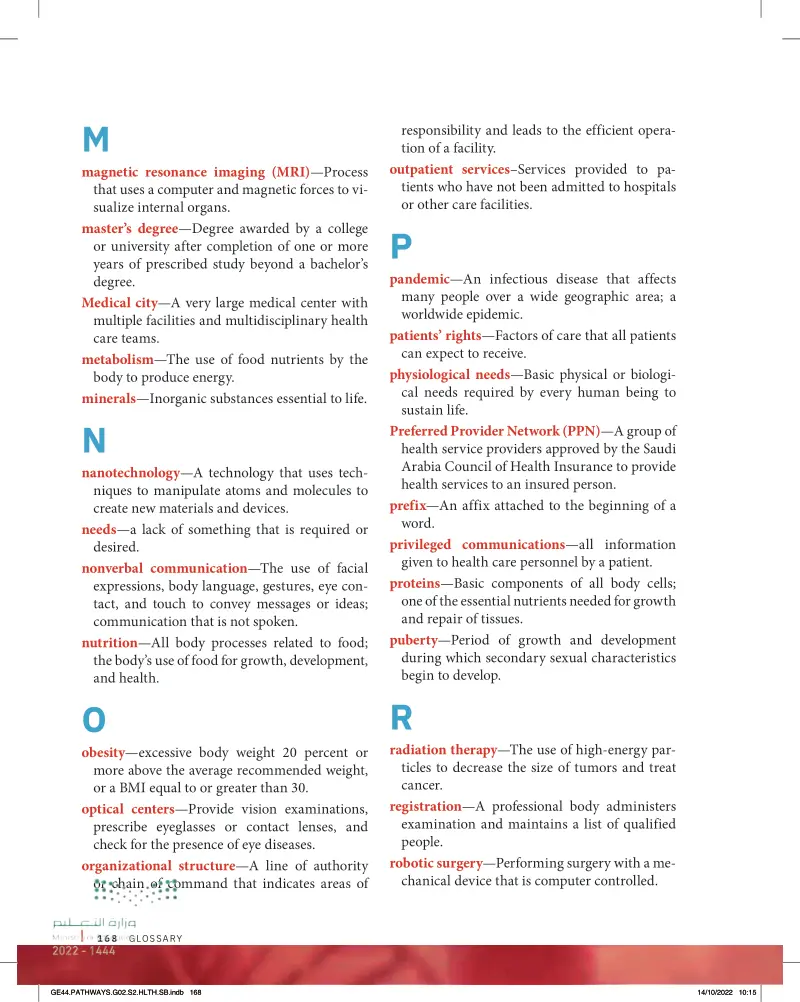
GLOSSARY: magnetic resonance imaging (MRI)
S safety-Needs that are important when physi ological needs have been met; include the need to be free from anxiety and fear, and the need to feel secure in the environment. scope of practice-The actions that health care practitioners are legally permitted to perform within the terms of their professional license. self-actualization-Achieving one's full potential. stress-Body's reaction to any stimulus that requires a person to adjust to a changing environment. suffix-An affix attached to the end of a word. T team-A group of people working together to achieve a common goal. teamwork-Cooperative effort by the members of a group to achieve a common goal. technology-Applying scientific knowledge for practical purposes to find answers and fix problems. telemedicine-The use of video, audio, and com- puter systems to provide medical and/or health care services. time management-System of practical skills that allows an individual to use time in the most effective and productive way. U ultrasound Noninvasive, computerized scan- ning technique that uses high-frequency sound waves to create pictures of body parts. V vitamins-Organic substances necessary for body processes and life. voluntary agencies-Agencies that are sup ported by donations, membership fees, fund- raisers, and grants to provide services such as health at national, regional, and local levels. W wellness-State of being in good health; being well. word roots-Main words or parts of words to which prefixes and suffixes can be added. وزارة التعليم Ministiger Educcision 2022-1444 GE44.PATHWAYS.G02 S2.HLTH.SB.indb 169 GLOSSARY 169 | 14/10/2022 10:15
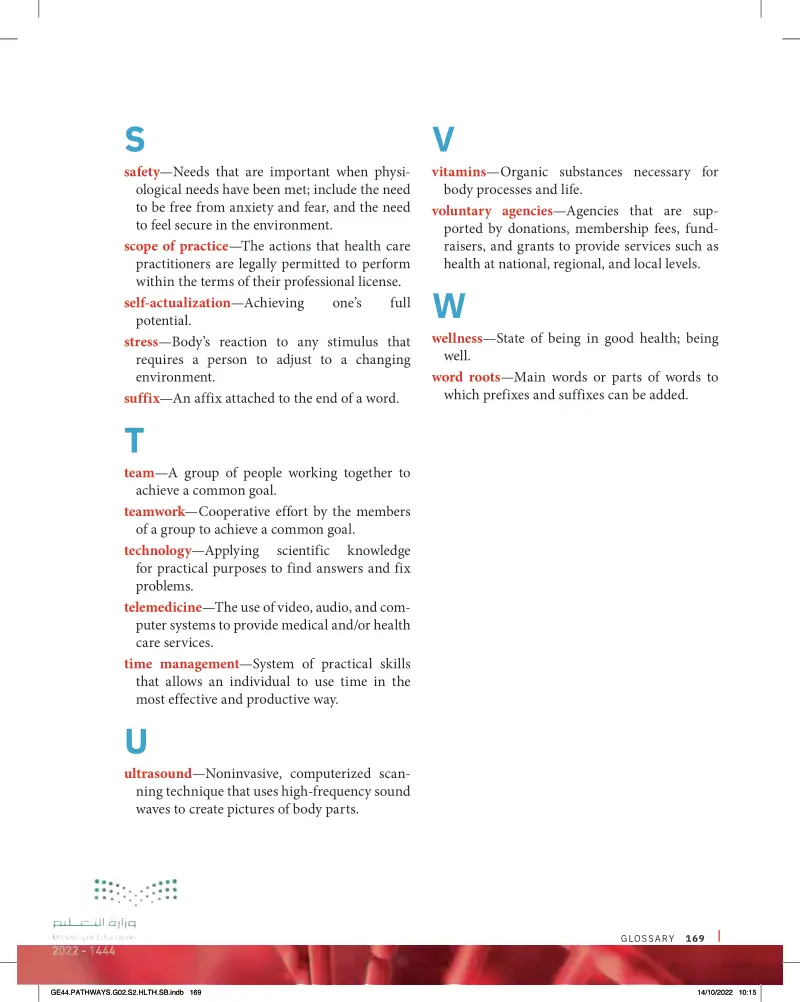
GLOSSARY: safety - scope of practice





